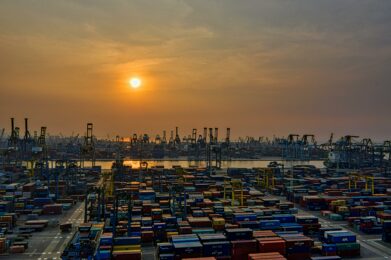Our Work
Home > Port Electrification Network
PORT ELECTRIFICATION NETWORK
PROGRAM OVERVIEW
The Port Electrification Network facilitates the effective deployment of electric vehicles and equipment at ports by creating a platform for port stakeholders to share successes and challenges in electrification.
Members of the Port Electrification Network convene monthly for focused collaboration sessions on port electrification topics such as shore power, EV charging infrastructure, and microgrids. The Electrification Coalition develops technical and informational resources based on member needs. Together, all network members will identify aligned policy priorities for engagement with federal and state agencies.
On February 28, 2024, the Environmental Protection Agency (EPA) released two notices of funding opportunity (NOFOs) for the Clean Ports Program. To learn more, read the EC’s Top 15 Takeaways.
PARTICIPANT BENEFITS
The Port Electrification Network brings together a diverse set of port stakeholders, including port authorities, vehicle and equipment manufacturers, shippers and carriers, logistics providers, utilities, and real estate providers. Members attend monthly meetings between 1 and 1.5 hours and contribute to discussions by providing relevant information on port electrification efforts.

Members benefit from participating in cutting-edge discussions on the state of port electrification with thought leaders and experts nationwide. Members also benefit from knowledge sharing around federal grants under the Bipartisan Infrastructure Law and the Inflation Reduction Act, such as the much-anticipated Clean Ports Program. Lastly, members can participate in developing resources that will be shared with the public and shape the national conversation on port electrification.
For questions related to the Port Electrification Network or to get involved, contact us at pen@electrificationcoalition.org.
WHY PORTS MATTER
Medium- and heavy-duty (MHD) vehicles contribute significantly to local air pollution, making up 32% of nitrogen oxide (NOX) emissions and 23% of greenhouse gas (GHG) emissions. Moreover, low-income communities and communities of color that are often neighbors of ports, trucking corridors, and warehouses face disproportional pollutant-related health impacts. Electrification of port vehicles and equipment can reduce emissions and the consumption of diesel fuel, improving air quality for port communities.
Seaports, inland river ports, and intermodal hubs face evolving challenges in electrifying equipment. Electric vehicles and equipment have higher upfront costs than diesel counterparts. Vehicle charging and shore power infrastructure require significant grid capacity, requiring close collaboration with utilities and charging providers. Fleet and terminal operators, who have an intimate understanding of diesel equipment operation, are unfamiliar with the operational capabilities and the charging and maintenance requirements of electric equipment. Pilot projects provide valuable insights into these challenges, but crucial information is often not publicly available, meaning that most projects start at square one with limited knowledge.
